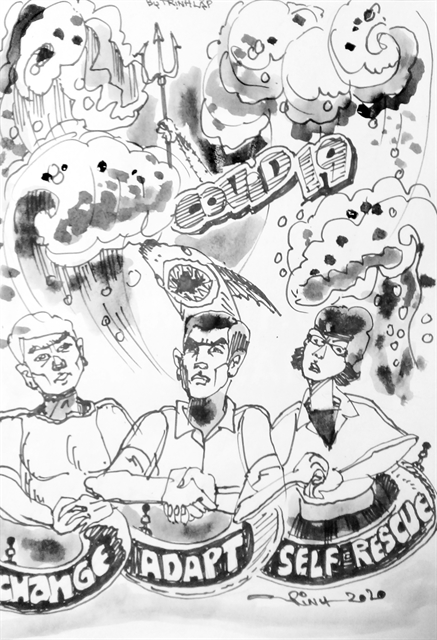 Talk Around Town
Talk Around Town

In only a few months, millions of people have lost their jobs because of the COVID-19 pandemic, which could forever transform the way we work.
By An Phương

|
| Illustration by Trịnh Lập |
In only a few months, millions of people have lost their jobs because of the COVID-19 pandemic, which could forever transform the way we work.
According to recent research by Vietnamworks, about 40 per cent of workers in Việt Nam have lost their jobs.
Ngọc Mai, 29, my high school friend, told me that she lost her job as an accountant in a tourism company because of the effects of the pandemic.
“I thought I was safe from being laid off since my position was quite important. However, I lost it in mid-March, and I'm currently looking for a new job at the moment,” she said.
“As travel of all kinds was halted at that time, I totally understood that my company had to cut costs to balance their budget,” she added.
Thanh Quý, 25, a manager’s assistant at Mai’s company, was asked to submit his resignation letter as well.
“My lack of experience made it easier for the company to make a decision. Even though I was upset at first, I believe I still have multiple opportunities now that the pandemic situation in Việt Nam has turned a brighter page,” he said.
After talking to two other friends who have experienced the same issue, I have come to realise that they were sort of mentally ready for what could have come and were thus quite positive, even though their financial status was at risk.
“It might be because we’re from the younger generation that usually expects the unexpected,” Quý said.
Mai and Quý all agreed that it must be more difficult if their dads and uncles were to experience the cut off.
“The longer an employee stays at a company, the stronger bonds he or she makes. I cannot imagine how devastating it could be for an experienced older person to cope up with the situation, especially if they are the breadwinner of their family,” Mai said.
It’s almost June and my friends have moved on from this unfortunate incident. As they are looking for new jobs, they've raised an issue that I’ve found to be very relevant – has employees' value been affected if they were on their company’s layoff list during the pandemic?
“I'm nervous because I don’t want my future recruiters to think that I’m less competent compared to my colleagues who were able to keep their jobs at my former company where I used to work,” Thanh said.
Of course, an employee’s value or status is affected somehow. However, given the situation that 40 per cent of workers are experiencing the same problem, I believe it’s more important to tell recruiters what you have learned during this time and what you have done to perfect your skills during the social distancing period.
According to Tăng Gia Hải Lam from Buzzmetrics, new candidates applying for the company’s interviews must show that they are ready for the “new normal” in the company to which they are applying.
“Are you aware of the 'new normal' conditions in your field? What have you done to get yourself ready for this new state? Why should the company choose you during this 'new normal' period? These are some of the questions that candidates must keep in mind before the interviews,” Lam told Tuổi Trẻ (Youth) newspaper.
“I did exactly so!” Thanh said. “I’ve sent out several applications and I am currently looking forward to two interviews. Since it is extremely difficult to find jobs at the moment, I’m putting in 200 per cent of my effort to seize any opportunity. The 'new normal' needs people who are truly capable of performing meaningful tasks."
Thanh’s answer inspired me to think of another relevant topic, which is how the coronavirus pandemic might have changed the way we work forever.
In addition to useful skills, I believe employees in the 'new normal' world must never take anything for granted.
“The belief that my job was stable and my position was safe enough sort of destroyed me mentally when I first heard of the layoff,” Thanh said.
In fact, two other friends of mine who were working in technology and the food and beverage industries told me the same thing.
“Now that we’ve learned the lesson the hard way, we will never let ourselves become too comfortable with the job but always seek better solutions to get the job done. The market is very competitive at the moment,” they said.
It’s also very important to be digitally competent during the 'new normal' because most meetings could be replaced by emails and automation could increase.
“As many 9-to-5 jobs could be effectively done from home during the social distancing period, small companies these days have thought of cutting costs on office rentals and letting their employees work on their own,” said Tuấn Tú, 30, a friend of mine and product manager at a financial company.
“Digital competence now has become an indispensable skill when it comes to assessing one person’s work skill,” he said, noting that the pandemic has highlighted the most essential activities that certain companies should perform to sustain their business. The 'new normal' will be built upon these.
To add to Tú’s point of view, I would also like to address the importance of flexibility in the 'new normal' world.
“I love flexibility in almost every aspect of life, but when it comes to professional work, it’s crucial for all employers to communicate their expectations,” Tú added.
Compared to last year, 2020 has definitely witnessed drastic changes with how we are going about our daily lives and professional work.
2020 needs stronger workers, and, in fact, everyone should be stronger not just for themselves, but for your close ones around you. VNS




